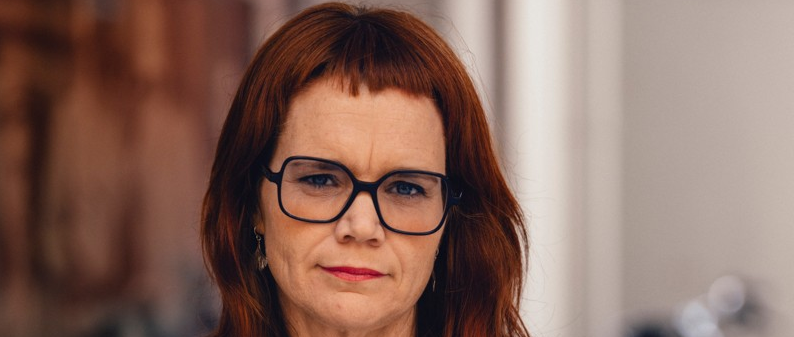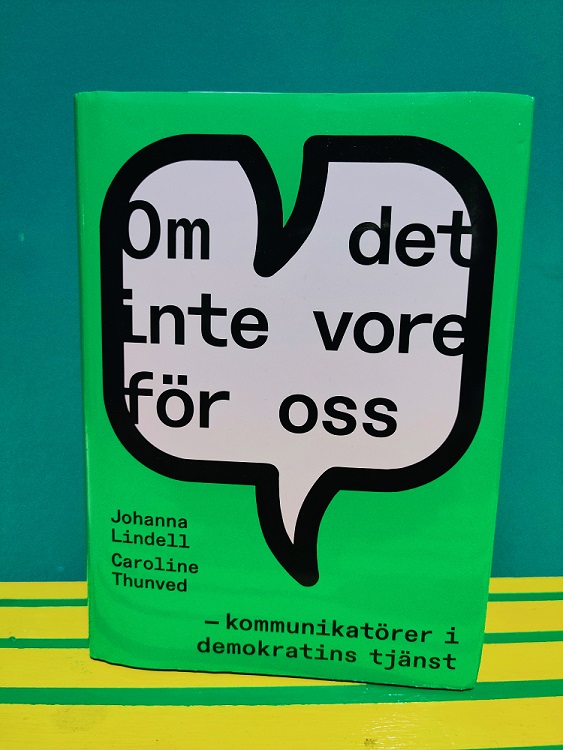We spoke to one of the authors of "If it wasn't for us," where 12 public sector communicators give their take on what role they play in Swedish democracy.

25 January 2024
Before they go into the studio, the editor-in-chief of a local media tells a little fun fact to Johanna Lindell. They are on their way to the radio for a debate.
“What the hell do communicators do,” says the editor-in-chief, "is one of the topics with the most reader interactions in our comment feeds."
"It's crazy," Johanna bursts out through the Zoom connection.
Of course, this is only an indication. But it's not the only one. In several European countries, the number of communication and press officers in public sector authorities has given rise to critical media coverage from journalists, politicians and opinion leaders.
It seems paradoxical. Are communicators bad at communicating about themselves? If that's the reason, or part of it, maybe it's about to change.
What public sector communicators work with
In any case, Johanna Lindell, who is the director of the Swedish union DIK, and Caroline Thunved, who is the general secretary of the professional network Sweden's Communicators, have set out with their new book to show the world what communicators employed by public sector authorities think they work with.
The main part of "Om det inte vore för oss" - if it wasn't for us - consists of interviews with 12 Swedish communicators from public sector authorities including municipalities, regions, the police and the health sector.
Johanna Lindell emphasizes that the book is a partisan contribution to a debate and not an attempt to make an objective study of the impact of public sector communication on the democratic conversation and democracy.
"We had a hypothesis from the beginning that public sector communicators are an important component of a democratic society," Johanna Lindell points out.
She explains that she and Caroline Thunved have interviewed the communicators about communicative efforts that most citizens may not think that much about. Communication about school choice and care for the elderly, foreign disinformation campaigns, citizens' fundamental rights and voting procedures.
"Surely it is possible to have a society without communicators. But if that was the case, it's questionable whether everyone could access the information to which they are entitled. This also applies to information translated into different languages," says Johanna Lindell.

Not impressed with the debate
She is not overly impressed with the public debate about public sector communication and communicators. It takes place in two tracks, according to her.
"Partly it is about public sector communicators versus journalists. That communicators prevent journalists from carrying out their investigative work. I think there is a need to continue that debate," she says.
"Furthermore, there is the debate about there being too many (communicators, ed). It could be debates about municipal slogans, whether every single one of the 290 Swedish municipalities should have its own slogan. You can ask yourself what it's good for," she continues.
She emphasizes that a debate about what tax payers money should be used for is certainly necessary. But she thinks that a lot of the voices in the debate do not fully comprehend what public sector communicators are actually doing.
"I mean, I think we must constantly discuss what we should prioritise. But my impression is that some of these discussions are a little too much clickbait and are about attracting traffic to a website," she argues.
"They simply feel bad because of this"
"Unfortunately, I think that part of that debate is not leading us forward. These are populist debates that have a negative impact on our members [public sector communicators, ed.]," says Johanne Lindell.
She continues: "They simply feel bad about this. It is clear that it is not so cool to go to work when you think that you are fighting for the good, working to get information out there to the citizens, and at the same time you have politicians who say that you are an worthless; people receive emails in their inboxes telling them they are scum and so on.”
Maybe a bit on the defensive side
In the book it is stated that public sector communication is not about 'putting lipstick on the pig', i.e. to paint too beautiful pictures of reality.
But the book itself contains mostly examples of positive cases where public sector communicators highlight the positive impact they have on democracy and society. Don't the authors risk putting lipstick on the pig themselves by failing to address criticism from journalists about poor accessibility or misleading the public?
"It was something we considered during the writing process," Johanna Lindell explains. "Can this have the opposite effect? Obviously, we could have asked people about what they've done that didn't turn out so well. And we could probably have been more critical in our reflections," she admits.
She notes that she and her co-author may have been slightly influenced by a number of highly critical stories in the media.
Crucial to both democracy and dictatorship
On the cover of the book you can read one of the quotes from the interviewees, Varg Gyllander from the Swedish National Police: "Communicators are as essential to democracy as they are to dictatorship.”
According to Johanna Lindell, how does democratic government and public sector communication differ from public sector communication in non-democratic countries?
“When it comes to telling the truth, I think basically. As a public sector communicator in a democracy, I think you are always looking to give people the truth," she says.
—–
The interviewees in the book are:
- Magdalena Casteryd, Head of Communications Uppsala Municipality
- Johanna Wiechel Steier, Communications Director Region Halland
- Johan Ehrning, head of communications at the hospital in Uppsala
- Kalina Wallenberg, Marketing Manager Västerbottensteatern
- Evelina Nilsson, marketing communicator at the municipally owned Kulturhusbolaget
- Susanna Uppling, Head of Communications Stockholm City Archives
- Ingrid Persson, Head of Communications, Malmö University
- Varg Gyllander, former press officer at the National Police Chief
- Mikael Hvinlund, director of communications at the Employment Agency
- Mia Wadman, head of planned communication at the Swedish Health Authority
- Magnus Hjort, Director General, Agency for Psychological Defense
- Pascal Tshibanda, communications director at Botkyrka municipality
- Silvia Ernhagen, former communications manager Forum for living history
Read more
News article on ProPublica.dk 22 August 2023: Too much or too little? Swedish government investigation of public sector communication coming up